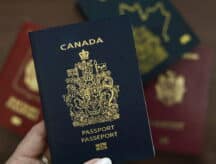Important Changes to Canada’s Citizenship Act to Come Into Effect Next Week
Permanent residents of Canada can enjoy a quicker, simpler citizenship naturalization process after key measures contained in Bill C-6, Changes to the Citizenship Act, come into effect next week on October 11.
Speaking in Brampton, Ontario on October 4, Canada’s Minister of Immigration, Ahmed Hussen, stated that changes have been “long awaited by permanent residents” who have “been eagerly awaiting these changes.” C-6 had been passed into law last June, but some of its most important provisions did not come into effect immediately. The government had stated that some elements of C-6 would come into effect in the fall (autumn).
"We want all permanent residents in Canada to become citizens. That's our wish, because we value Canadian citizenship, we understand we are a community that continues to welcome people from all over the world. And we understand the importance and the positive role that immigrants play in our economy, in our society, and in our cultural life," Minister Hussen said.
"We have a responsibility to ease their path to Canadian citizenship," he added.
Among the changes that come into effect on October 11 are measures covering the number of days that an applicant must spend as a permanent resident before applying for citizenship, and how those days may be counted.
Previously, applicants for citizenship had to amass 1,460 days (four years) of residence in Canada within a six-year period, all of it on permanent status, before applying for citizenship.
Following the changes, applicants are only required to have amassed 1,095 days (three years) of residence in Canada over a five-year period before becoming eligible. Further, individuals who spent time in Canada on work or study status or as a protected person before becoming a permanent resident may count up to 365 days of this time as a temporary resident towards their overall residency days. In such cases, each actual day spent in Canada on such a temporary status is counted as a half-day (in other words, for every two days spent in Canada on eligible temporary status, one day may be counted towards citizenship eligibility, up to a maximum of 365 days).
For citizens-to-be who came to Canada to work or study, this important change may reduce the amount of time one has to spend in Canada as a permanent resident before being eligible for citizenship, in some cases from four years down to as little as two years.
In addition, as of next week the government will no long require applicants for citizenship to be physically present in Canada for 183 days or more in four out of the six years preceding their application.
“With these changes — with the ease of the physical presence requirements, for example — and the flexibility that we are introducing to those requirements means that permanent residents will be able to apply for citizenship sooner, but they will also be able to have the flexibility to do so,” stated Minister Hussen.
Other changes to the Citizenship Act will also come into effect on October 11.
| Previous regulation | New regulation |
|---|---|
| Applicants had to be physically present in Canada for four out of six years before applying for citizenship. | Applicants must be physically present in Canada for three out of five years before applying for citizenship. |
| Applicants had to file Canadian income taxes, if required to do so under the Income Tax Act, for four out of six years, matching the physical presence requirement. | Applicants must file Canadian income taxes, if required to do so under the Income Tax Act, for three out of five years, matching the new physical presence requirement. |
| Applicants had to be physically present in Canada for 183 days in four out of the six years preceding their application. | This provision is repealed. Applicants no longer have to meet this requirement. |
| Time spent in Canada prior to becoming a permanent resident did not count towards the physical presence requirement for citizenship. | Applicants may count each day they were physically present in Canada as a temporary resident or protected person before becoming a permanent resident as a half-day toward meeting the physical presence requirement for citizenship, up to a maximum credit of 365 days. |
| Applicants between 14 and 64 years had to meet the language and knowledge requirements for citizenship. | Applicants between 18 and 54 years must meet the language and knowledge requirements for citizenship. |
Earlier this year in June, other provisions of C-6 came into effect. These included the repeal of the previous provision whereby applicants were required to intend to continue to live in Canada if granted citizenship. Another provision that was repealed at that time meant that dual citizens living in Canada who are convicted of treason, spying and terrorism offence now face the Canadian justice system, like other Canadian citizens who break the law, whereas previously their citizenship could be revoked.
Canadian citizenship is one of the most sought citizenships globally, as it brings with it opportunities that are not available to permanent residents. First and foremost, Canadian citizens may apply for and obtain a Canadian passport, one of the most valuable passports in the world. Further, citizens can leave and re-enter Canada without needing to be mindful of residency requirements for the purpose of maintaining status. Citizens may also vote and stand for political office, giving them full participation in one of the world’s great democracies.
Initial steps
“For many people, the dream of Canadian citizenship may have just become a bit more attainable. However, it is important to note that, with the exception of a handful of cases, everyone who ultimately becomes a naturalized citizen of Canada must first become a permanent resident,” says Attorney David Cohen.
“Fortunately, Canada offers a broad range of immigration programs through which individuals and families may obtain permanent residence, the most well-known of which are arguably the federal economic immigration programs managed under the Express Entry selection system.
“In addition, there are Provincial Nominee Programs, programs managed by the province of Quebec, options for business persons, programs whereby Canadian citizens and permanent residents may sponsor family members, and, of course, Canada’s long-standing tradition of refugee resettlement. Through these programs, as well as ongoing initiatives to welcome international students and foreign workers, Canada is bringing in hundreds of thousands of people annually, many of whom will no doubt go on to become full-fledged citizens of this great nation.”
Evaluating eligibility
With C-6 now law and its most important measures now in effect, readers can find out if or when they may be eligible to apply for Canadian citizenship using the CanadaVisa Citizenship Calculator.
To find out more about applying for Canadian citizenship in light of the proposed changes to the Citizenship Act, please send an email to citizenship@canadavisa.com. Please include information about your time as a Canadian permanent resident, as well as any information about previous time spent in Canada with temporary status.
To find out if you are eligible to immigrate to Canada through one of the currently available programs, please fill out a free online assessment today.
© 2017 CICNews All Rights Reserved
- Do you need Canadian immigration assistance? Contact the Contact Cohen Immigration Law firm by completing our form
- Send us your feedback or your non-legal assistance questions by emailing us at media@canadavisa.com







